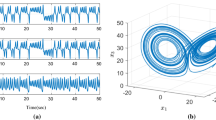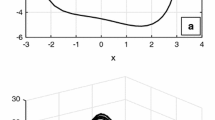Abstract
This paper proposes to decompose the nonlinear dynamic of a chaotic system with Chebyshev polynomials to improve performances of its estimator. More widely than synchronization of chaotic systems, this algorithm is compared to other nonlinear stochastic estimator such as Extended Kalman Filter (EKF) and Unscented Kalman Filter (UKF). Chebyshev polynomials orthogonality properties is used to fit a polynomial to a nonlinear function. This polynomial is then used in an Exact Polynomial Kalman Filter (ExPKF) to run real time state estimation. The ExPKF offers mean square error optimality because it can estimate exact statistics of transformed variables through the polynomial function. Analytical expressions of those statistics are derived so as to lower ExPKF algorithm computation complexity and allow real time applications. Simulations under the Additive White Gaussian Noise (AWGN) hypothesis, show relevant performances of this algorithm compared to classical nonlinear estimators.
Similar content being viewed by others
References
G. E. P. Box, G. M. Jenkins, and G. C. Reinsel, Time series Analysis, Forecasting and Control, Englewood Cliffs, Prentice-Hall, NJ, 1994.
S. K. Yang and T. S. Liu, “State estimation for predictive maintenance using Kalman filter,” Reliab. Eng. Syst. Safety, vol. 66, pp. 29–39, 1999.
R. E. Lawrence and H. Kaufman, “The Kalman filter for the equalization of a digital communications channel,” IEEE Trans, Commun. Technol., vol. COM-19, no. 6, pp. 1137–1141, Dec. 1971.
H. Fujisaka and T. Yamada, “Stability theory of synchronized motion in coupled-oscillator systems,” Prog. Theor. Phys. vol. 69, pp. 32–47, 1983.
L. Pecora and T. Caroll, “Synchronization in chaotic systems,” Phys. Rev. Lett, vol. 64, no. 2, pp. 821–823, 1990.
M. Hasler, “Synchronization of chaotic systems and transmission of information,” Int. J. Bifurcation and Chaos, vol. 8, no. 4, pp. 647–659, 1998.
K. M. Cuomo and A. V. Oppenheim, “Synchronized chaotic circuits and systems for communications,” MIT Res. Lab. Electron., TR 575., Nov. 1992.
K. M. Cuomo, A. V. Oppenheim, and S. H. Strogratz, “Synchronization of Lorenz-based chaotic circuits with application to communication,” IEEE Trans. Circuits Syst. II, vol. 40, no. 10, pp. 626–633, 1993.
A. Germani, C. Manes, and P. Palumbo, “Polynomial extended Kalman filter,” IEEE Trans. Aut. Control, vol. 50, no. 12, pp. 2059–2064, Dec. 2005.
A. Germani, C. Manes, and P. Palumbo, “Filtering of stochastic nonlinear differential systems via a Carleman approximation approach,” IEEE Trans. Aut. Control, vol. 52, no. 11, pp. 2166–2172, Nov. 2007.
G. Chen and T. Ueta, “Chaos synchronization in noisy environments using Kalman filters,” Chaos in Circuits and Systems, pp. 509–527, World Scientific, 2002.
T. S. Schei, “A finite-difference method for linearization in nonlinear estimation algorithms,” Automatica, vol. 33, no. 11, Nov. 1997.
M. S. Arulampalam, S. Maskell, N. Gordon, and T. Clapp, “Tutorial on particle filter for online Nonlinear/NonGaussian Bayesian Tracking,” IEEE Trans. Signal Processing, vol. 50, no. 2, pp. 1174–188, Feb. 2002.
N. J. Gordon, D. J. Salmond, and A. F. M. Smith, “Novel approach to nonlinear/NonGuassian Bayesian State Estimation,” IEE Proc. vol. 140, no. 2, pp. 107–113, 1993.
A. Gelb, Applied Optimal Estimation, MIT Press, Cambridge, 1974.
Y. Bar-Shalom and X.-R. Li, Estimation and Tracking: Principles, Techniques and Software, Artech House, Boston, 1993.
S. Julier, J. Uhlmann, and H. F. Durrant-Whyte, “A new method for the nonlinear transformation of means and covariances in filters and estimators,” IEEE Trans. Automat. Contr., vol. 45, no. 3, pp. 477–82, 2000.
E. A. Wan and R. van der Merwe, Kalman Filtering and Neural Networks, Chap. 7: The Unscented Kalman Filter, editors S. Haykin, Wiley Publishing, 2001.
M. Norgaard, N. K. Poulsen, and O. Ravn, “New developments in state estimation for nonlinear systems,” Automatica, vol. 36, pp. 1627–1638, 2000.
M. B. Luca, S. Azou, G. Burel, and A. Serbanescu, “On exact Kalman filtering of polynomial systems,” IEEE Trans. Circuits Syst. I, vol. 53, no. 6, pp. 1329–1340, 2006.
M. Yahia, P. Acco Particle filter applied to polynomial chaotic maps, European Conference on Circuit Theory and Design, pp. 535–538, Antalya, 2009.
Author information
Authors and Affiliations
Corresponding author
Additional information
Recommended by Editorial Board member Duk-Sun Shim under the direction of Editor Jae Weon Choi.
Moussa Yahia was born in Fej-M’zala, Jijel, Algeria. He received his Diploma in Electrical Engineering and the Magister degree from the Department of Electronics, University of Constantine, Algeria in 1992 and 1997, respectively. He is finishing a Ph.D. degree in le Laboratoire de l’elétromagnétisme et Télécommunications (LET). Since 2001 he has been an adjunct lecturer in the department of Electronics, University of Jijel. His research activities concern nonlinear signal processing, secure communications relying on chaotic dynamics.
Pascal Acco received his Ph.D. degree in Automatic control from the Institut National des sciences Appliquée, Toulouse, France. Currently, he is an Assistant professor in Automatic Control and Electronics at the Institut National des sciences Appliquée and University of Toulouse. His research interests include the study of variable structure control applied to uncertain systems and chaos in telecommunication.
Malek Benslama was born in Constantine, Algeria, in 1953. He received the Diploma Engineer from Polytechnic School Algiers in 1978. He received DEA EEA, Doctor Enginner and State doctorat from ENSEEIHT Toulouse France in 1979, 1982, and 1992, respectively. Actually, He has a professor at Constantine University and he manages the Doctoral Space Telecommunications School. He has also member of scientific and technical Council of Algerian Space Agency. His research interests include communications systems, satellite systems and microwave engineering.
Rights and permissions
About this article
Cite this article
Yahia, M., Acco, P. & Benslama, M. Estimation of nonlinear systems via a Chebyshev approximation approach. Int. J. Control Autom. Syst. 9, 1021–1027 (2011). https://doi.org/10.1007/s12555-011-0601-9
Received:
Revised:
Accepted:
Published:
Issue Date:
DOI: https://doi.org/10.1007/s12555-011-0601-9




